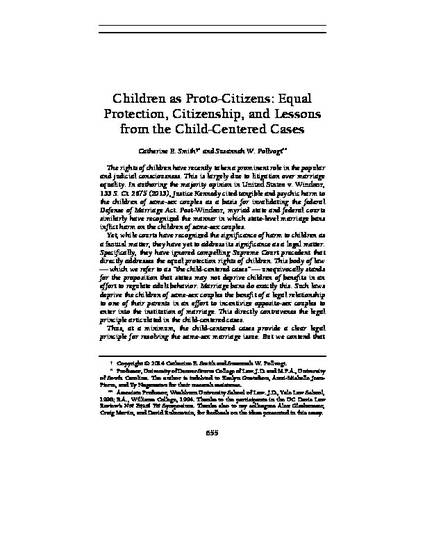
Article
Children as Proto-Citizens: Equal Protection, Citizenship, and Lessons from the Child-Centered Cases
U.C. Davis Law Review
(2014)
Abstract
The rights of children have recently taken a prominent role in the popular and judicial consciousness. This is largely due to litigation over marriage equality. In authoring the majority opinion in United States v. Windsor, 133 S. Ct. 2675 (2013), Justice Kennedy cited tangible and psychic harm to the children of same-sex couples as a basis for invalidating the federal Defense of Marriage Act. Post-Windsor, myriad state and federal courts similarly have recognized the manner in which state-level marriage bans inflict harm on the children of same-sex couples.
Yet, while courts have recognized the significance of harm to children as a factual matter, they have yet to address its significance as a legal matter. Specifically, they have ignored compelling Supreme Court precedent that directly addresses the equal protection rights of children. This body of law — which we refer to as “the child-centered cases” — unequivocally stands for the proposition that states may not deprive children of benefits in an effort to regulate adult behavior. Marriage bans do exactly this. Such laws deprive the children of same-sex couples the benefit of a legal relationship to one of their parents in an effort to incentivize opposite-sex couples to enter into the institution of marriage. This directly contravenes the legal principle articulated in the child-centered cases.
Thus, at a minimum, the child-centered cases provide a clear legal principle for resolving the same-sex marriage issue. But we contend that these cases offer much more. In particular, in the child-centered cases we see the Court giving greater meaning to equal protection guarantees because it views children as proto-citizens. In this context, the Court recognizes certain substantive rights — namely, public education, family formation, and the right to transfer economic benefits from one generation to the next — as foundational to citizenship, and therefore worthy of special judicial solicitude. The Court recognizes that depriving children of these rights at the beginning of life sets a pattern of marginalization and deprivation that has lasting effects on their ability to develop into full-fledged citizens.
The citizenship theme running through the child-centered cases is significant for several reasons. First, it connects equal protection jurisprudence to the concept of citizenship. Second, it draws attention to the substantive rights associated with citizenship-formation. Third, while the special concerns articulated in these cases are inspired by the fact that the plaintiffs are children, recognizing the interference with the individual’s ability to develop as a citizen can and should be extended to adults as well. In this sense, we are all proto-citizens — citizens in progress — entitled to basic civil rights necessary to thrive in our democracy.
Disciplines
Publication Date
2014
Citation Information
Susannah Pollvogt and Catherine E. Smith. "Children as Proto-Citizens: Equal Protection, Citizenship, and Lessons from the Child-Centered Cases" U.C. Davis Law Review Vol. 48 (2014) p. 655 Available at: http://works.bepress.com/susannah-pollvogt/2/
